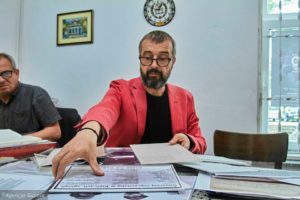NEWS Poland, a Journey into Kielce Pogrom and the New Wave of Anti-Semitism
Kielce is the polish town where one of the greatest pogrom occurred after World War II. In 1946, 40 Jews survivors from the Holocaust were killed by the local population and more than 80 were injured. During the communist period, the responsibilities of polish populations were removed, but after the 1989 Bogdan Bialek, a Polish journalist and a psychologist born in Bialywstok in 1955, decided to break the silence and to stimulate a public discussion on those events. The documentary “Bogdan’s journey” originates from his confrontation with the deepest prejudices of Kielce’s people. Filmed in Poland, Israel and the United States, the film got important prizes all around the world. A moving trip among the memories of the witnesses and the reactions of the people of the town. We think that it is of great important to talk about these events at a time of rising antisemitism in Poland and in all Europe. That’s the reason that pushed us to interview him about his work.
The pogrom of Kielce is one of the most tragic page against Jews during the postwar period, when did you decide to organize the march of remembrance?
An idea of the Memory March started to float around in 2000. It was the effect of noticing the fact, that formalized memory and official events had only minimal effect on reality or even had no effect. In 1996 I contributed in organizing the first official ceremony commemorating the Kielce Pogrom. The prime minister of Poland and the mayor of Kielce took part in the event. Many beautiful and important words were said. The years passed by and wasn’t make any activity, which could enable the society of Kielce to confront with its difficult past, to build long-lasting bridges of reconciliation with the Jewish society, living in Poland and outside Poland, and above all to create the project for a society of the future without hate and violence.
Which were the reactions of the citizens? In the film you also speak about attacks against your person.
From the beginning we were met with real interest. Sometimes with reservations, sometimes with critics, but without hostility and aggression. The personal attacks against me, slanders, threats, and even acts of physical violence, heading to intimidation, took place in the first half of the Nineties., when I was writing about pogroms and about the acts of antisemitism which often occurred in that time in the local newspaper, where I was the editor-in-chief.
In a scene of the documentary, you express your disillusionment because of the silence of the media, including Polish Jewish media. Did you find support in the Jewish community and in the Israeli centers?
No, I didn’t receive any support from the Jewish institutions or organizations, besides the personal, very meaningful involvement of a few people, specially Mr Yaacov Kotlicki (his family was from Kielce) and Mrs Avigail Moshe from Jerusalem, who is involved in the inter-religious dialogue.
You interviewed people that still blame to communist police for the pogrom, have you noticed any different approaches between generations? Have you found that the young generations more inclined to admit and reflect about the past faults?
It is a pity, but there is no difference between generations. There aren’t any differences also based on political orientations. But I have to specify that I haven’t don any researches, this is only based on my impressions.
At the beginning of the film, you highlight that you’re a Polish Christian. In which way your Christianity influenced your work? We’re used to think that the Christian prejudices against Judaism are one of the main causes of European anti-Semitism.
Yes, in my opinion Christianity contributed in strengthening anti-Semitism, but anti-Semitism is older that Christianity. However I think that if the declaration Nostra Aetate (1965), which completely changed the approach of the Catholic Church towards Jews and Judaism, had happened before 1939, it could have stopped the Holocaust and the acts of violence against Jews during and after the Second World War, in Poland and in other European countries.
The current Polish government is perceived as xenophobic and authoritarian. In recent rallies supported by the government anti-Jewish slogans were heard. Is anti-Semitism growing again in your country?
Anti-Semitism, xenophobia, chauvinism and even neofascism are in Poland as alive as never before. During the PiS government, the Polish State has deprived itself voluntarily of the instruments for preventing these anachronic social phenomena, law enforcement bodies are inactive or function very slowly and ineffectively, and the official representatives of the Polish government diminish the scale of this phenomenon. The authority takes total responsibility for the islamophobia and antisemitism, for the acts of nationalistic aggression.
In 2015 you established the Institute for the Culture of Encounter and Dialogue, do you find obstacles in your work?
No, I was never met with acts of obstruction, paradoxically I even received big moral support. Only once, a few days ago someone painted on my fence the sign of the organization of British neo-fascist terrorists Combat 18, which cooperate with the polish neo-fascists, and also the swastika.

